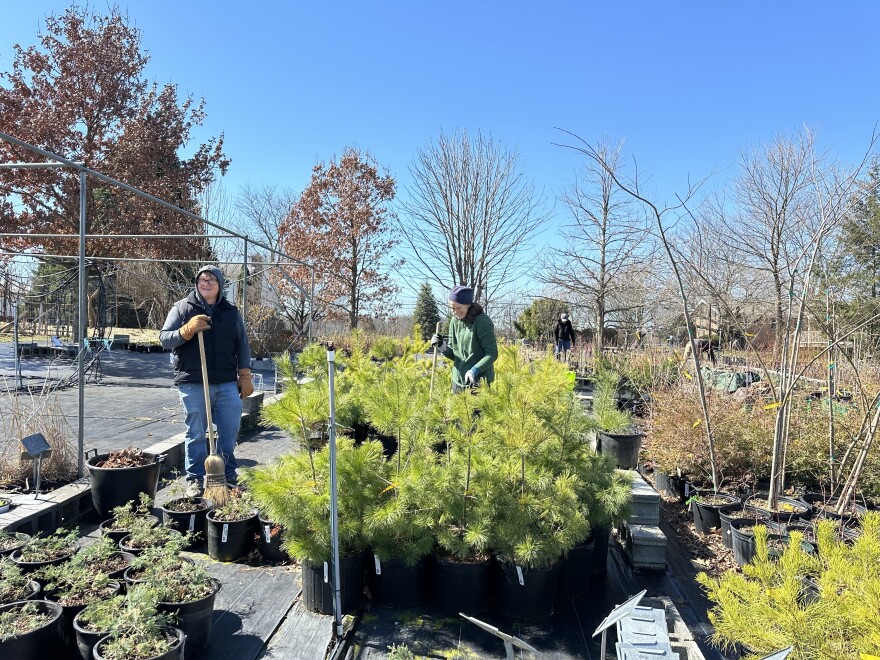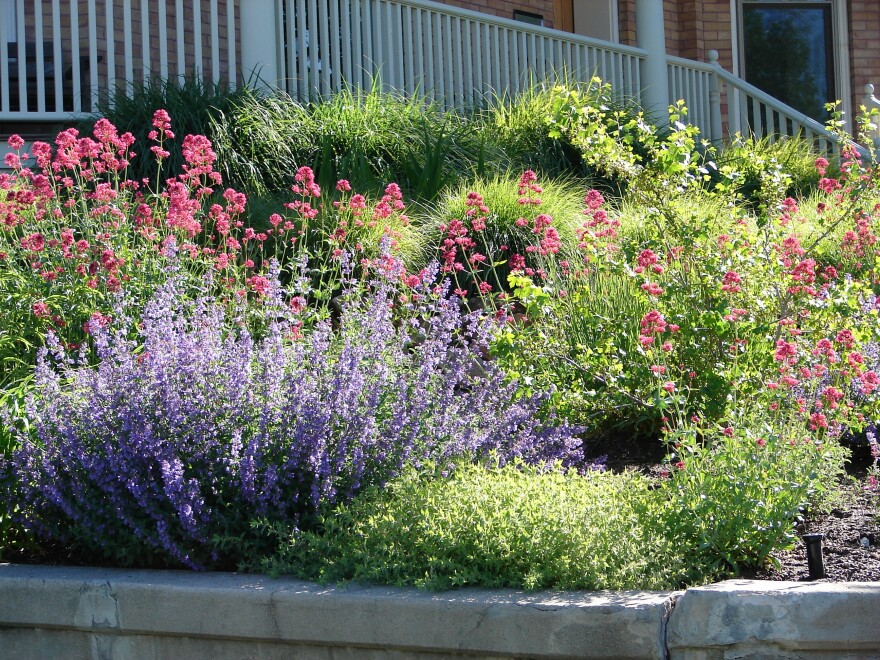OREFIELD, Pa. — The wind had a blustery chill to it, and the seedlings and sprouts at Edge of the Woods Plant Nursery were barely poking through their soil beds.
Louise Schaefer and Sue Tantsits didn't seem to mind.
"Even if things are dormant, the garden still has a job to do," Schaefer said, leaning against a backdrop of butterfly paintings, plant diagrams and a "Make America Green Again" sign. Lucy, her Havanese pup, slept contentedly nearby.
According to Schaefer and Tantsits, gardens, if grown and maintained properly, provide a miniature snapshot of their surrounding ecosystem. Vital to their function is the presence of native plants — they give native pollinators food to eat. Experts say 35% of the world's food depends on pollination. The cycle repeats.
Black-eyed Susans, goldenrods, asters, and chestnut trees are just a few of the plants native to Pennsylvania.
They also are just a few of the plants for sale at Edge of the Woods, a cozy plant nursery nestled off Route 100 in Orefield.
Schaefer and Tantsits, who own the business, specialize in the production and retail sale of plants specific to the Keystone State.
Even more so, they said they wish to be a resource for those in the Lehigh Valley seeking education on pollinators or wishing to start a native plant garden of their own.
'Let's start a plant nursery!'
Schaefer and Tantsits met at the Wildlands Conservancy in Emmaus, where the two worked in educational programming and facilities management.
Garden centers in the Lehigh Valley were common, but there wasn't a nursery that specialized in native plants and pollinator gardens.
"I remember thinking, 'Whoa, OK!'"Edge of the Wood Plant Nursery co-owner Sue Tantsits
"I remember sitting down with her one day and being like 'Let's start a native plant nursery,'" Schaefer, of Emmaus, said.
"I remember thinking, 'Whoa, OK!'" said Tantsits, a resident of Fogelsville.
What was a cornfield behind a dentist's office became the canvas for what now is a humming property complete with walking trails, a rain garden, two greenhouses and even a chestnut tree orchard.
It's closed for the season now, but preparations are well underway for the April 1 opening.

Offerings from 'canopy to ground'
The nursery offers more than 300 species of plants from all over the state, with a special emphasis on covering "from canopy to the ground."
Aside from flowers, the nursery sells trees, shrubs, grasses and more, all of which are vital to the health of a pollinator garden.
"People come here looking for a plant, and they leave with a firm understanding about the difference between aesthetic gardens and what will actually help the environment,"Edge of the Woods Plant Nursery co-owner Louise Schaefer
Schaefer and Tantsits say people come from all over to visit Edge of the Woods — from New Jersey, New York, Washington D.C., and even North Carolina.
Schaefer and Tantsits don't simply sit at the register waiting for customers to check out; they can be seen interacting with customers and guiding them toward a plant purchase best suited for them and their garden.
For those who can't make the trip to Orefield, Schaefer and Tantsits also hold informational webinars and Zoom chats for those looking to learn more.
"People come here looking for a plant, and they leave with a firm understanding about the difference between aesthetic gardens and what will actually help the environment," Schaefer said.

"Putting aesthetics aside"
According to Tantsits, the onset of European-style landscaping places a special emphasis on matching colors, manicured lawns and excavated land.
"We hope that 100 years from now, when Edge of the Woods is gone, scientists will study this area and say 'Gosh! Look at how many native plants are in the Lehigh Valley!'"Edge of the Woods Plant Nursery co-owner Louise Schaefer
"We are sitting on highly disturbed land," Tantsits said. "With the onslaught of farmers and cutting wood and building roads and warehouses, all this human activity has changed these systems.
"Think of all the plants that are getting destroyed anytime something gets bulldozed."
Their work in pollinator gardens brings the land back to its roots, literally and figuratively.
"Any plant that goes out our door, it is one step closer to restoring our natural environment," Schaefer said. "We hope that 100 years from now, when Edge of the Woods is gone, scientists will study this area and say 'Gosh! Look at how many native plants are in the Lehigh Valley!'"
Learn more about Edge of the Woods on their website.


